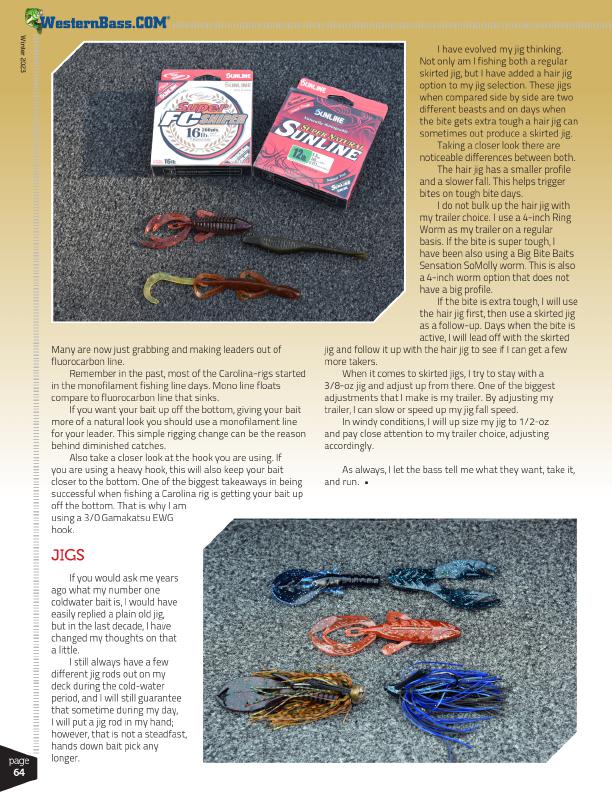
®
Winter 2023
page 64
Many are now just grabbing and making leaders out of fluorocarbon line.
Remember in the past, most of the Carolina-rigs started in the monofilament fishing line days. Mono line floats compare to fluorocarbon line that sinks.
If you want your bait up off the bottom, giving your bait more of a natural look you should use a monofilament line for your leader. This simple rigging change can be the reason behind diminished catches.
Also take a closer look at the hook you are using. If you are using a heavy hook, this will also keep your bait closer to the bottom. One of the biggest takeaways in being successful when fishing a Carolina rig is getting your bait up off the bottom. That is why I am using a 3/0 Gamakatsu EWG hook.
JIGS
If you would ask me years ago what my number one coldwater bait is, I would have easily replied a plain old jig, but in the last decade, I have changed my thoughts on that a little.
I still always have a few different jig rods out on my deck during the cold-water period, and I will still guarantee that sometime during my day, I will put a jig rod in my hand; however, that is not a steadfast, hands down bait pick any longer.
I have evolved my jig thinking.
Not only am I fishing both a regular
skirted jig, but I have added a hair jig
option to my jig selection. These jigs
when compared side by side are two
different beasts and on days when
the bite gets extra tough a hair jig can
sometimes out produce a skirted jig.
Taking a closer look there are
noticeable differences between both.
The hair jig has a smaller profile
and a slower fall. This helps trigger
bites on tough bite days.
I do not bulk up the hair jig with
my trailer choice. I use a 4-inch Ring
Worm as my trailer on a regular
basis. If the bite is super tough, I
have been also using a Big Bite Baits
Sensation SoMolly worm. This is also
a 4-inch worm option that does not
have a big profile.
If the bite is extra tough, I will use
the hair jig first, then use a skirted jig
as a follow-up. Days when the bite is
active, I will lead off with the skirted jig and follow it up with the hair jig to see if I can get a few more takers.
When it comes to skirted jigs, I try to stay with a 3/8-oz jig and adjust up from there. One of the biggest adjustments that I make is my trailer. By adjusting my trailer, I can slow or speed up my jig fall speed.
In windy conditions, I will up size my jig to 1/2-oz and pay close attention to my trailer choice, adjusting accordingly.
As always, I let the bass tell me what they want, take it, and run. •